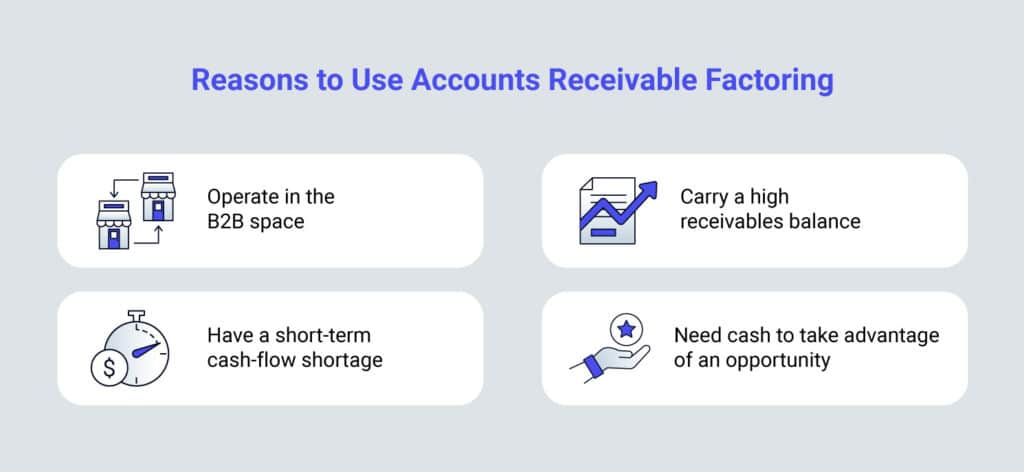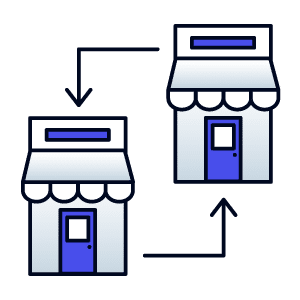Exchange Outstanding Client Bills for Cash
Invoices often don’t get paid promptly, and the terms can result in cash flow gaps as you wait 30, 60, or even 90 days for payment.
Depending on this capital for daily operations, payroll, and growth can strain your small business financially.
But what if you could receive payment immediately for the work you’ve already done?
With accounts receivable factoring, you can.
Contents
SECTION 1
Understanding Accounts Receivable Factoring
Accounts receivable factoring is a financial transaction where a factoring company purchases a business’s unpaid invoices and takes on the responsibility of collecting them. In return, the factoring company provides the business with an advance on a percentage of the invoice’s face value.
How Does Invoice Factoring for Small Businesses Work?
The factoring company typically advances 70%-90% of the invoice value to the business seeking funding.
The amount advanced and the cost of the service depend on several factors, including:
- Size of the invoice(s)
- Average days receivables remain outstanding
- Creditworthiness of the customers with outstanding invoices
- Industries of the customers to whom the receivables are attached
Once the factoring company collects the outstanding receivables, it pays the business the remaining balance, minus the factoring fees, also known as the discount rate. These fees usually accrue weekly until the receivables are paid.
SECTION 2
When Is Accounts Receivable Factoring the Right Choice?
If you operate in the business-to-business (B2B) sector and issue invoices with defined repayment terms, you may qualify for invoice factoring. This financing method is particularly beneficial for industries with long payment cycles, as it allows you to unlock cash tied up in receivables.
Since factoring decisions are primarily based on the quality of your invoices, the review process is quicker than applying for a conventional small business loan. In some cases, funds can be made available the same day you apply.
Businesses might consider invoice factoring if they:
- Operate in the B2B sector
- Maintain a high balance of receivables
- Experience short-term cash flow shortages
- Require cash to seize new business opportunities

SECTION 3
What Do the Best Small Business Invoice Factoring Providers Look For?
The following invoice characteristics typically result in the most favorable rates and terms for accounts receivable financing:
Newer Invoices
Newer invoices are considered more valuable because they have a higher likelihood of being paid compared to older invoices. To increase your chances of qualifying for accounts receivable financing, ensure your invoices are recently issued.
Invoices from Larger Companies
Invoices from larger companies with substantial annual revenue are more attractive to lenders. These invoices are seen as less risky because larger businesses are generally more reliable in terms of payment. Conversely, if your client lacks sufficient working capital, your invoice may be deemed too risky, making it harder to qualify.
Smaller Invoices
Smaller invoices are viewed as less risky by accounts receivable factoring companies. The smaller the amount owed, the more likely your client is to pay, making these invoices more favorable for financing.
SECTION 4
What Does Accounts Receiving Factoring Cost?
The cost of invoice financing depends on your factor rate and the time it takes your customers to pay their invoices.
Accounts receivable factoring rates generally range from 1% to 5%. Smaller invoices and those from higher-risk customers typically incur higher fees. Additionally, there may be a one-time processing fee.
Accounts Receivable Factoring Example
Let’s say you want to factor $20,000 in invoices. The factoring company charges a one-time processing fee of 3% and a weekly factor rate of 2% of the total invoice value until it is fully paid. They advance you 85% of your invoices, which amounts to $17,000.
The cost structure would be as follows:
-
Amount of financed invoice: $20,000
Advance amount: $17,000
One-time 3% processing fee: $600
1.02 weekly factor rate: $204 per week
It takes your customer a total of 3 weeks to repay the invoice. As a result, the invoice factoring company deducts $1,212 from the $3,000 reserve amount.
| Fee | Weeks to Repayment | Total | |
| One-time 3% processing fee | $600 | N/A | $600 |
| 1.02 weekly factor rate | $204 per week | 3 | $612 |
| Total Invoice Financing Cost: $1,212 | |||
The invoice financing company issues you a $1,788 rebate.
| Reserve | $3,000 |
| Total invoice financing cost | $1,212 |
| Rebate: $1,788 | |
SECTION 5
How to Qualify for Small Business Invoice Factoring
One of the benefits of accounts receivable factoring is that lenders prioritize the financial qualifications of your customers over those of your own business.
Leading factoring companies will perform a reputational analysis, conduct a business credit check, and thoroughly review your customers’ payment history with your company.
Although the financial health of your business is less crucial, it may still be evaluated and could impact the advance amount and factoring rates you receive.
SECTION 6
Accounts Receivable Factoring: Frequently Asked Questions
Accounts receivable financing and factoring are distinct processes.
Accounts Receivable Financing: This method allows you to use the value of your invoices as collateral to secure an advance or line of credit. The financing company provides a percentage of the invoice’s face value, but you remain responsible for collecting payments from your customers and repaying the debt in equal installments over a term, typically ranging from 3 to 6 months.
Accounts Receivable Factoring: In this process, the factoring company purchases your invoices outright. The factoring company then takes over the responsibility for collections and may contact your customers directly to obtain payment.
When accounts receivables are factored with recourse, the factoring company can require the business that sold its receivables to repay the amount if the invoiced customers do not settle their debts. This type of factoring generally offers lower rates compared to non-recourse factoring because the factor assumes less risk in the event that the invoices are uncollectible.
Pros
- Improved Cash Flow: Late payments can put a strain on your cash flow. By securing an advance against receivables, you gain immediate access to cash without needing to press your clients for immediate payment.
- Better Borrower Accessibility: Traditional loans often require collateral, a strong credit score, and several years in business—requirements that many small business owners cannot meet. Accounts receivable factoring, however, is based on the likelihood that an invoice will be paid, so you don’t need to provide collateral. Lenders primarily focus on your customers’ ability to repay their debts.
Cons
- High Costs: Invoice factoring usually involves higher rates compared to many other small business financing options. Factor rates are often charged weekly until the customer pays the outstanding invoices.
- Holdbacks: Your accounts receivable provider typically retains a portion of your invoice funds until your customers pay their invoices in full.
A few popular invoice factoring companies include:
- AltLine: A division of the Southern Bank Company, AltLine holds an A+ rating with the Better Business Bureau (BBB) and has earned the organization’s accreditation.
- ECapital: This company boasts a 4.6-star customer rating on Trustpilot and an A- rating with the BBB.
- TCI Business Capital: TCI Business Capital has received a 4.5-star rating on Google Reviews and an A+ rating from the BBB.







